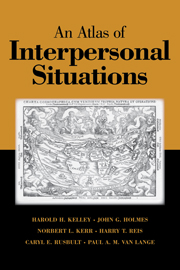Book contents
- Frontmatter
- Contents
- Preface
- PART ONE INTRODUCTION AND THEORY
- PART TWO THE SITUATIONS
- Single-Component Patterns
- Entry #1 Independence: We Go Our Separate Ways
- Entry #2 Mutual Partner Control: I Scratch Your Back, You Scratch Mine
- Entry #3 Corresponding Mutual Joint Control: Getting in Sync
- Entry #4 Conflicting Mutual Joint Control: Match or Mismatch
- Two- and Three-Component Patterns
- Time-Extended Patterns
- Incomplete Information Situations
- N-Person Situations
- Movement from One Situation to Another
- PART THREE EPILOGUE
- References
- Author Index
- Subject Index
Entry #2 - Mutual Partner Control: I Scratch Your Back, You Scratch Mine
Published online by Cambridge University Press: 21 October 2009
- Frontmatter
- Contents
- Preface
- PART ONE INTRODUCTION AND THEORY
- PART TWO THE SITUATIONS
- Single-Component Patterns
- Entry #1 Independence: We Go Our Separate Ways
- Entry #2 Mutual Partner Control: I Scratch Your Back, You Scratch Mine
- Entry #3 Corresponding Mutual Joint Control: Getting in Sync
- Entry #4 Conflicting Mutual Joint Control: Match or Mismatch
- Two- and Three-Component Patterns
- Time-Extended Patterns
- Incomplete Information Situations
- N-Person Situations
- Movement from One Situation to Another
- PART THREE EPILOGUE
- References
- Author Index
- Subject Index
Summary
Examples
The Mutual Partner Control situation rests on each individual's preferences and aversion regarding the partner's possible behaviors. Each person's concern is “How do my partner's actions affect me, and how do my actions affect him or her?” This situation exists when people can benefit each other or not. For example, colleagues may (or may not) compliment each other's writing style, lovers may (or may not) exchange endearments, and cousins may (or may not) send each other greeting cards at Christmas. This situation also exists when people can harm each other or not. Members of opposing political parties may (or may not) deliver gratuitous insults and young siblings may (or may not) hurtfully poke each other. In each case, each person's choice is whether or not to have a positive or negative effect on the partner's outcomes.
Conceptual Description
There are two essential requirements for an ideal or “pure” situation of Mutual Partner Control. First, the outcome of each individual must be entirely in the hands of the interaction partner. Each individual's well-being is entirely under the control of the partner's actions. The individual can do nothing to enhance or ameliorate the partner's effect. For example, under many circumstances the two siblings can avoid or dodge each other's blows. To consider that as a situation of Mutual Partner Control, we would have to imagine their being in some confined space (e.g., the back seat of the family car) where such dodging is not possible.
- Type
- Chapter
- Information
- An Atlas of Interpersonal Situations , pp. 142 - 149Publisher: Cambridge University PressPrint publication year: 2003



